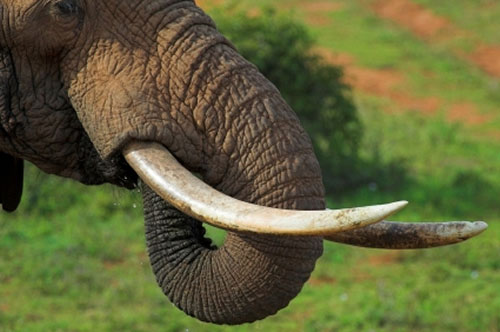Elephant met with art because of ivory advertising on Google
Conservationists warn that ads related to ivory products from Google are one of the reasons for the increase in ivory hunting.
The Environmental Investigation Agency (IEA), a UK non-governmental organization, said that about 10,000 Japanese ivory ads appear on Google. About 80% of them advertise 'hanko', small wooden seals are widely used in Japan to seal official documents. The remaining ads promote sculptures and other small items, Guardian reported.

Ivory trade is one of the topics discussed
most exciting during the Convention on International Trade in Species
Endangered wild in Thailand in recent days. (Photo: blogspot.com)
Hanko is a seal used in all areas, from a lease to a bank account. These seals are legitimate goods and people often put the word "ivory" on them.
EIA concludes that Japan's hanko sales are a 'factor affecting the large demand for ivory and causing elephant poaching across Africa to recur on a large scale'.
In a response letter, Google explained: 'Google does not permit the promotion of products related to endangered or threatened species. Immediately after detecting ads that violate advertising policies, we will destroy them. '
The EIA board announced they had sent a letter to Larry Page, Google CEO on February 22, urging Google to remove the ad because it violated Google's own policies. They said Google did not answer the letter or remove those ads.
'In the context of many elephants being killed throughout Africa to produce inexpensive jewelry, Google's failure to implement its own policies to protect endangered elephants makes many people angry. angry , "said Allan Thorton, president of EIA.
Restricting ivory trade is a major concern at the Conference of the International Trade Convention for Endangered Species (Cites), consisting of 178 member countries. The conference is taking place in Bangkok, Thailand.
- China: creating an ivory elephant
- Thailand will strengthen elephant protection
- Africa can clean forest elephants
- Africa suffered, helplessly watching the 1/3 of its elephants in the last 7 years
- Kenya employs 1,000 rangers to combat elephant poaching
- The killing of African elephants is out of control
- Google officially advertises on TV
- African elephants will decline by a fifth in the next 10 years
- Google tested mobile advertising services
- China: Pile the foundations, discover 10,000-year-old rare objects
- African elephants lose their ivory genes to avoid extinction
- Sumatra elephants face an increased risk of extinction
 Animal 'suffering' after hibernation
Animal 'suffering' after hibernation Why do goats climb well?
Why do goats climb well? Scientists were surprised to see chimpanzees eating turtles
Scientists were surprised to see chimpanzees eating turtles Giant catfish died deadly due to drought in Thailand
Giant catfish died deadly due to drought in Thailand